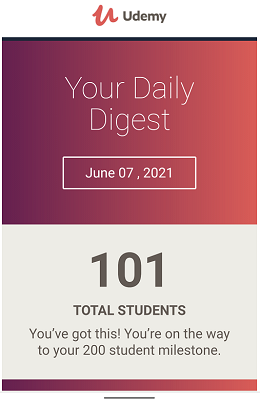Last year, I spent an incredibly long time creating a course on human-computer interaction (HCI) which I put up on the learning platform Udemy in August 2020.
It was a labour of love and the main reason it took me so long was that I decided to make the video lectures as short as possible, rather like the famous quotation:
If I had more time, I would have written a shorter letter…
Blaise Pascal, (1697)
Had I just presented all of my information without trying to make it as succinct as possible, like the way I describe a user persona in under a minute, then I am sure I would have finished much earlier. As it was, I was determined to make things as simple and as entertaining as possible so I spent weeks creating gacha animations to illustrate what I was saying in the shortest possible form.
Mini courses
I think now that my approach is off putting for some potential students, as I cram a lot into the lessons and the whole thing currently comes in under two hours. The other disadvantage of making my course so quick is that some Udemy instructors will put up a free mini-course of the same length so that students can do the mini-course and then receive an invite to the Instructor’s own website where an extended version of the same course is hosted.
It is a way of driving new students to their website to buy a course where the instructor has control over how much they earn. On their platform, Udemy discount courses to $9.99 every couple of weeks and then they take over half of each sale, so as an instructor I only ever end up with between $2 to $5 for each course sold, if it was on my own website, I would receive all of the money, but then I wouldn’t get as many students.
I have read lots of discussions about pricing and how to pick the right tier of pricing, and I have thought about changing my pricing but since students invariably enrol only when my course is discounted, it seems like it doesn’t really matter what price my course is at.
Marketing
Even though Udemy regularly send me emails reminding me to promote my course, I have found that my own promotions via this my website, or on social media, rarely lead to sales. Most of my sales comes from Udemy itself and the discount promotions that they run, which is why some instructors think that it is worth the effort to make a mini-course and put it as a free course on the Udemy platform.
My course is in direct competition with other similar courses which are much longer and much more expensive, so when a student is only paying $9.99 it seems likely that they would choose the bigger course with the biggest discounts or a mini-course of the same length for no money at all.
Udemy advice
When I created my course, I followed all of the Udemy advice to the letter from quick wins, and keeping lectures under four minutes. Since then I have done a couple of courses as a student and I’ve seen that some instructors have lectures of 20 minutes or more and they don’t follow the Udemy advice, nor do they try to be entertaining with graphics and so on, and yet they have plenty of students.
I have blogged about how I am an eternal student and why I created the course, and also what I would practically do differently if I was to do it again in: How I created an online course, but there are some other things I didn’t mention as I followed Udemy’s advice.
As advised, I did social media campaigns on my YouTube channel and on this website, releasing some of the lectures as previews, and blogging about them such as data transformation, one of my faves, but as I’ve said above, according to the analytics on Udemy about my course, all of the traffic I get to my course comes from the Udemy platform and so it makes no difference.
Udemy says give the course away for free and get people to write reviews, so I did that, and what was interesting was that some people couldn’t even be bothered to reply and say thank you, or even no thank you, in fact they acted as if they hadn’t received my invitation. At first I was a little bit put out but I guess my skin is a bit thicker now, especially after having dealt with reviews.
That said, other people unexpectedly came along and bought my course just for fun and to support me and that was just truly lovely.
And one person made me a beautiful pen in return for my course which is just the best.
Fielding reviews
Udemy says that in dealing with unfavourable reviews, I should write a response stating my case underneath the bad review in order to build a fan-base who will respond to bad reviews on my behalf. I haven’t seen this behaviour at all myself from trawling around bad reviews on popular courses on the Udemy platform.
I have noticed that I can flag terrible reviews and they will get deleted only if it makes Udemy look bad. For example, one person left a one star review saying that the audio on my course was very bad which I flagged as inaccurate because every course has to be reviewed for light and sound before Udemy publish it, so that review was deleted. But, when I flagged a one star without comments with a check box ticked to indicate that I wasn’t knowledgeable about my subject, even though I pointed out that I am knowledgeable (25+ years in the field, and a PhD etc.,) the review was allowed to stay as it didn’t technically have any offensive words. So a student can leave a damaging inaccurate one star review and not even have to justify it.
I occasionally look at my reviews in case a student has asked me a question or said something that merits a response. More often than not, students just leave stars and no words as Udemy asks people to leave reviews all the way through the course. Currently, the overview for my course shows stars 4.5/5 but the actual number next to them is 3.6/5 so who knows how that is calculated, all I know is that it only takes one or two 1-star reviews and the course average plummets.
Conclusions
I firmly believe that some students view it less favourably because I tried to make it fun and so it does not meet their expectations of how a serious computing course should look. In contrast, I had a couple of university lecturers ask me to show them how I had made my course so much fun. I guess this is because we were all in lockdown and so everyone was now in the business of creating online courses.
I enjoyed challenging myself by creating the course as it is a completely different way of teaching for me, and once I had finished, I thought I would do lots more courses, but so far, I haven’t come up with a completely new course, and if I did, I wouldn’t put it on Udemy. I would host it myself, and do a mini-course on udemy which would be a lot of work and no guarantee that it would be successful.
So, what I have decided to do is to improve this one as it has to stay up forever because the students who have bought it have been guaranteed lifetime access. In this way I get to enjoy creating more mini-lectures and rereading my blog and thinking about HCI, of which I never get bored.
By adding more sections I hope to really deliver on the promise I make in the introduction of creating a fusion of UX techniques and HCI theory. There is plenty of theory in there but the distinction is not always clear, and as I have blogged about everything and listed it in the post: 101 ways to think about HCI, I don’t think the upgrade should take too long. Though part of me would really like to make more gacha movies. Ha, and so it begins.
In the meantime I am going to use the promotional coupons Udemy gives me every month in the form of a link on my course page so that anyone can get a free copy of my course as it is, and then should they want to, they can take the course again once it is upgraded, two courses for the price of free.
I am curious now: how long will my course get if I take less time over it?
I can’t wait for this labour of love to begin!





